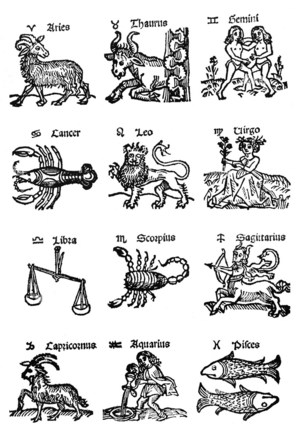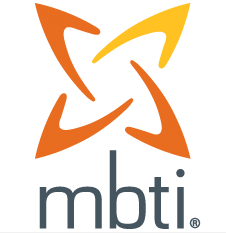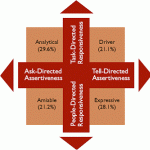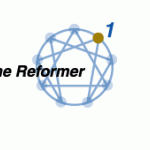Our consciousness and instincts constantly push us to learn more about ourselves and others. After all, maintaining self awareness is an important quality of a good leader. In attempts to better understand ourselves, society has developed multiple ways to classify people in a handful of categories. And I think we've had some limited success on this front.

- Image via Wikipedia
Astrology
This effort to categorize is not new. In the world of astrology, people are separated into 12 zodiac signs. As we know, the time of birth of an individual is the 'metric' for this classification. The folks belonging to a particular class or zodiac sign are believed to have a certain personality traits and qualities--like cancerians are reserved and family oriented. I can see these zodiac descriptions fit well with people I have encountered so far.
In other countries like India, moon-based zodiac is popular. The 28 positions (constellation or star) of the moon (as moon takes 28 days to revolve around the earth) are further classified into 12 moon-based zodiac signs. I suggest taking the commonality between sun and moon zodiac signs to understand one's traits; it has mapped my personality very well. Yeah..Yeah...I hear some of you calling me superstitious.
Yes, of course, there is some (okay..., a lot of) weakness to this model; no scientific data to back the observation. And that may be a driving force for looking forward to other scientific assessment tools--a few of them are listed below. In any case, whenever I get a chance I consult astrologers and enjoy their [contradicting] past and future predictions. This may have to do with satisfying the "Intuition" type of my MBTI trait !
Myers-Briggs Test Indicator (MBTI)
Myers-Briggs Test Indicator (MBTI) tool is widely used in many industries and schools to smoothly steer a team/group. Myers and Briggs invented this tool where they measure

psychological preferences in how people perceive the world and make decisions based on a psychometric questionnaire. This test rates the individual on following:
- Introvert or Extrovert (What do you prefer?)
- Intuition or Sensing (What do you do with information?)
- Thinking or Feeling (How do you make decisions?)
- Judgemental or Perception (What type of structure do you prefer?)
With this approach, I see we hosted the world population in 16 houses! The idea with this test is that if we know the personality of others, we appreciate their differences and work with them without much conflict, for the benefit of an organization.
Strengths Finder
Gallup's Strengths finder is another self assessment tool that identifies your top 34 themes of talents. The top 5 strengths are typically one's dominant signature strengths and they encourage one to use that to succeed in professional life. Of course the last five themes are not the quite strengths, but areas where one could potentially develop. Remember, your last five themes may be someone else's top five strengths and they may be adept in using those for their success.
Input Output Processing Template (I OPT)

There are few tests to test one's leadership styles such as "I OPT" test (Input Output Processing Template). Here they map one's leadership personality in the following domains: Hypothetical Analyzer, Relational Innovator, Reactive Stimulator and Logical Processor.One could have primary and secondary leadership styles and varying percentages in these scales.
There are four other metrics--Perfector, Changer, Performer and Conservator--which decide which leadership trait you employ. These results highlight the natural leadership inclinations inherent to one's approach. They also identifies one's vulnerabilities and thus guide in selecting appropriate styles for a group.
Other Tests
There are hundreds of other personality and social style programs out there such as:

- Wilson Social Styles (classifies people as Driver, Expressive, Amiable and Analytical)
- Riso-Hudson Enneagram Type Indicator (RHETI) (this classifies personality into 9 types: Reformer, Helper,Motivator, Artist, Thinker, Skeptic, Generalist, Leader, and Peacemaker)

There are relationship compatibility tests as well. In any case, a thinker is always a thinker in MBTI and in RHETI. An analytical personality is always so in IOPT, Wilson styles and in Strength finder!
Summary
Some of these personality and leadership tools, aside from astrology, could help us prepare to lead a team better or be a good contributor. These tools increase the versatility of individuals by temporarily adapting their behavior to improve communication, persuade effectively, and reduce conflicts.
There are some inherent challenges here. Not everyone wants to take these tests and even if they do, they may not want to divulge their results simply because many people don't like to be labeled. Nevertheless, an anonymous aggregate group assessment could help, to an extent, in understanding group behavior. I was told once:
Don't form a team or group based on individual personality and leadership scores. Form a team first based on the requirements and expertise and then use these scores and test to extract maximum benefits out of the team.
Projects definitely need people with different personality and leadership styles during various stages of executions. So having a particular trait and style does not make one superior or inferior to another person. I feel, if used wisely, these tools will help not only professional organizations but also volunteer organizations!
What about the thought of getting married to someone based solely on a blind astrological (horoscope) match? There are such marriages, rather successful marriages, in some parts of the world. Such successful marriages stand not as a proof of astrology but rather as a testimony to the greatness and versatility of human beings to make things work. So the above tests can certainly help us understand each other and organizations better.
But, in the end, because we are humans, we can't always simply box people in a few groups and label them with tags and scores!
What is your MBTI?
Your Opinions and Comments?
Related articles by Zemanta
- MBTI and Enneagram - How do they relate? (personalityplusinbusiness.com)
- Are Introverts Nuts? (psychologytoday.com)
- Personality & Career Path: Assessing Your Options (brighthub.com)



Comments
This is great stuff. I had just finished a class that covered all these categorization models, and my take away was that though it was helpful to think in these terms they are less pivotal in building a model to improve when compared to emotional intelligence (EQ)...of course everything is always up for debate, but like the underpinnings of the EQ model best. My hate goes off to you for pulling this all togther though. It must have taken a tremendous amount of time.
Your "hate goes off..? or would that be hat? J/K. Have a seat on the sofa while I warm some non-caffeinated coffee. Let's talk about what's going on in your life and how you feel about it. Now relax.... ;-)
Thanks Dave ! As I had taken some of these tests/assessment, it was little easier for me to pull all these together. I think you should educate us more on the underpinnings/traits of EQ and point out the similarities/differences. This will benefit the audience here.
I'm a sucker for these kinds of tests. I used to scour the net looking for IQ tests to prove to myself that the last one was just a fluke (not saying which way...hehe). I'm an introvert too. Hey, I'm talking about myself here...your master plan is working RC! Anyway, Psychology Today just ran a nice article on what it means to be introverted. I can stand up and give animated presentations in front of 400 ppl and then collapse the next day like I ran 10 miles. Taking pleasure from internal gates, that's me. Perfectionist too...that's a monkey I've been trying to pry off. Anyway, great post.
I am an introvert too and I can understand the symptoms. Looks like most of the engineers will fall under "INTJ" and this poll is showing that trend.
I will pull an EQ post together, but will be sure to edit it better then I do my comments...lol
Thanks Dave. That would be great !!
BTW, any real time experience with using these tools to understand and steer the team in any professional or volunteer organization?
@RC - I've worked at an Eng consultancy where they sent us for an orientation including MBTI assessment w/in our first year. It was incredibly enlightening for most of the people involved and gave us some really good insight on how to deal with the rest of our team. It was simple things (like understanding the importance an agenda had to the organized introverts, or why some people seemed intent on thinking out loud in meetings) that enabled us to assess the way others were communicating. Once you could see that their behaviour wasn't simply rude (even though the there is a delicate balance between personality differences and unacceptable social behaviour), it was easier to accept the content of someone's interaction even if it wasn't necessarily delivered in the same way you might do so. Our team came away from it feeling as though it was beneficial for us to know for ourselves, but that we had to be careful not to discount or pigeonhole anyone due to their newly acquired 'label.'
[...] Daniel Goleman’s ideas about emotional intelligence, evidently prompted by his response to an earlier post. Between the two posts my head is [...]